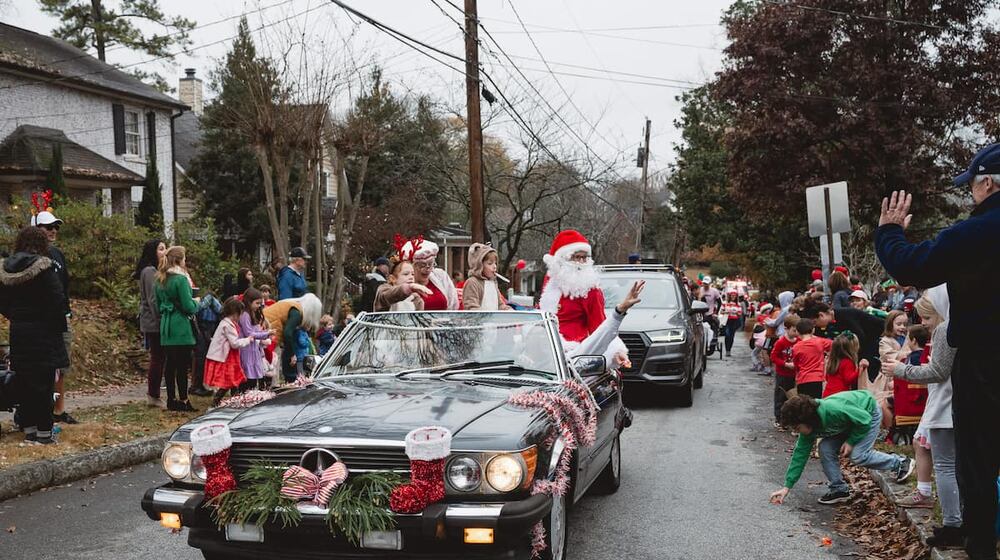They all weren’t on pitch.
But at least they weren’t creepy.
"We are the clowns!" a chorus line of balloon-pantsed performers sang at the start of an exuberant mid-morning gig at a Gwinnett County nursing home last week. "We are the clowns!"
That they are. And give the goofy gang from Peachtree Clown Alley serious props for publicly admitting it. With the nation deep in the throes of "Creepy Clown" hysteria, it takes a a painted-on smile and a stiff upper lip to be in the funny business business right now. For the past few months, reports of scary clown sightings, incidents and threats have been emerging faster than clowns from a tiny car at the circus.
Most of these evildoing events likely never happened — not that that really helps “good” clowns at this point.
"Because of the 'creepy clowns' some people think you're dangerous," Carl Line, aka "Dont Kno" the clown, acknowledged at this month's meeting of Peachtree Clown Alley, an organization of Atlanta area clowns that's been around for more than three decades (an "alley" is the name for a clown club).
With noms-de-clown like Dont Kno, Handyman, Baby Cakes and Mr. Popcorn, many of PCA's approximately 30 members are professional clowns. Others clown as a hobby and volunteer their silly services at events sponsored by nonprofit organizations. Any and all members who can take part in the "Clown Show on the Road" events PCA puts on as a public service several times a year, like the one at the nursing home.
The one thing nearly all “real” clowns share right now is a sense of frustration: One minute, they were innocently making balloon animals and squirting water out of carnations on their jacket lapels.
And then the next minute … kaboom! This creepy clown thing hit them like a coconut cream pie smack in the kisser.
"I feel differently than a year ago," admitted PCA president Connie Davis, whose clown persona, Daisy, frequently sports automatic grin-inducing polka-dotted pantaloons. "People would see you in your car in your clown outfit and wave and take pictures. Now they see you and maybe wonder what (creepy) thing you are going to do?"
“I’m glad I have tinted windows in my car,” another clown called out from the back of the room at First Baptist Church in Doraville where PCA meets on the third Monday of each month to share tips, watch demonstrations and promote clowning and clown knowledge to its members and the general public.
There is some scary precedent here. Over the years, isolated “evil” clown sightings have occasionally been reported. And “Coulrophobia” — an intense fear of clowns — is a real thing experienced by some unfortunate souls.
But this most recent bout of clownsteria is something else again. It appears to have begun in late August in South Carolina, where people in clown getups reportedly scared folks in Greenville County and even offered several children money to follow them into nearby woods.
Helped by social media, the so-called "Creepy Clown" phenomenon quickly spread across the country, with reports of terrifying-looking clowns offering candy to kids in Winston-Salem, N.C.; attacking a woman in Cincinnati; ominously wandering the streets of Green Bay (while clutching black balloons no less), and making threats against Atlanta schools on social media (In a letter recently sent to parents, Atlanta schools superintendent Meria Carstarphen said police were investigating and that the district had no credible evidence of any threat made against a specific school)
MORE: A map of creepy clown "sightings" in Georgia
Indeed, investigations elsewhere have turned up almost no credible sightings or threats involving “creepy clowns.” But that hasn’t stopped some places from painting all clowns with an overly broad and creepy brush anyway: In Mississippi, the Kemper County Board of Supervisors unanimously approved an ordinance this month that makes it unlawful for any person of any age to appear in public in a clown costume, clown mask or clown makeup until the day after Halloween.
Luckily, the PCA clowns are made of stronger, sillier stuff. At the October meeting, they took turns reading aloud their code of ethics, otherwise known as The Eight Clown Commandments (no smoking or drinking alcohol while in clown makeup and costume, a good clown makes fun of him/herself, not others, etc.). A few days later, a half-dozen members showed up at the nursing home, where they spent close to 40 minutes singing, performing magic tricks and sight gags and telling jokes, some better than others.
“Clowns don’t care if we get a grin or a groan, at least we know we have made an impact,” clown KC Joy (civilian name: Katherine Venson) said afterwards. “We bring the sunshine.”
Sunshine? Shoot, those creepy clowns don’t stand a chance.





